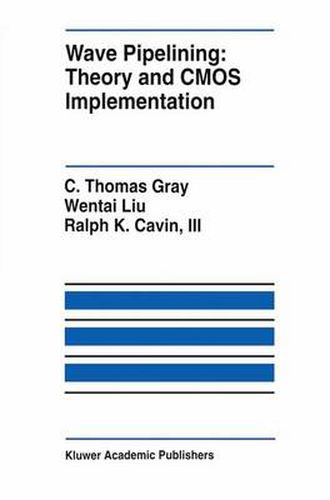Readings Newsletter
Become a Readings Member to make your shopping experience even easier.
Sign in or sign up for free!
You’re not far away from qualifying for FREE standard shipping within Australia
You’ve qualified for FREE standard shipping within Australia
The cart is loading…






This title is printed to order. This book may have been self-published. If so, we cannot guarantee the quality of the content. In the main most books will have gone through the editing process however some may not. We therefore suggest that you be aware of this before ordering this book. If in doubt check either the author or publisher’s details as we are unable to accept any returns unless they are faulty. Please contact us if you have any questions.
This text presents the theory of wave pipelined operation of digital circuits and discusses practical design techniques for the realization of wave pipelined circuits in CMOS technology. Wave pipelining is a timing methodology used in digital systems to enhance performance while conserving the number of data registers used. This is achieved by applying new data to the inputs of a combinatorial logic block before the previous outputs are available. In contrast to conventional pipelining, system performance is limited by differences in maximum and minimum circuit delay rather than maximum circuit delays. Realization of practical systems using this technique requires accurate system level and circuit level timing analysis. At the system level, timing constraints identifying valid regions of operation for correct clocking of wave pipelined circuits are presented. Both single stage and multiple stage systems including feedback are considered. At the circuit level, since performance is determined by the maximum circuit delay difference, highly accurate estimates of both maximum and minimum delays are needed. Thus, timing analysis based on traditional gate delay models is not sufficient. For CMOS circuits, data dependent delay models considering the effect of simultaneous multiple input switchings must be used. An algorithm using these delay models for accurate analysis of small to medium sized circuits is implemented in a prototype timing analyzer, XTV. Results are given for a set of benchmark circuits.
$9.00 standard shipping within Australia
FREE standard shipping within Australia for orders over $100.00
Express & International shipping calculated at checkout
This title is printed to order. This book may have been self-published. If so, we cannot guarantee the quality of the content. In the main most books will have gone through the editing process however some may not. We therefore suggest that you be aware of this before ordering this book. If in doubt check either the author or publisher’s details as we are unable to accept any returns unless they are faulty. Please contact us if you have any questions.
This text presents the theory of wave pipelined operation of digital circuits and discusses practical design techniques for the realization of wave pipelined circuits in CMOS technology. Wave pipelining is a timing methodology used in digital systems to enhance performance while conserving the number of data registers used. This is achieved by applying new data to the inputs of a combinatorial logic block before the previous outputs are available. In contrast to conventional pipelining, system performance is limited by differences in maximum and minimum circuit delay rather than maximum circuit delays. Realization of practical systems using this technique requires accurate system level and circuit level timing analysis. At the system level, timing constraints identifying valid regions of operation for correct clocking of wave pipelined circuits are presented. Both single stage and multiple stage systems including feedback are considered. At the circuit level, since performance is determined by the maximum circuit delay difference, highly accurate estimates of both maximum and minimum delays are needed. Thus, timing analysis based on traditional gate delay models is not sufficient. For CMOS circuits, data dependent delay models considering the effect of simultaneous multiple input switchings must be used. An algorithm using these delay models for accurate analysis of small to medium sized circuits is implemented in a prototype timing analyzer, XTV. Results are given for a set of benchmark circuits.